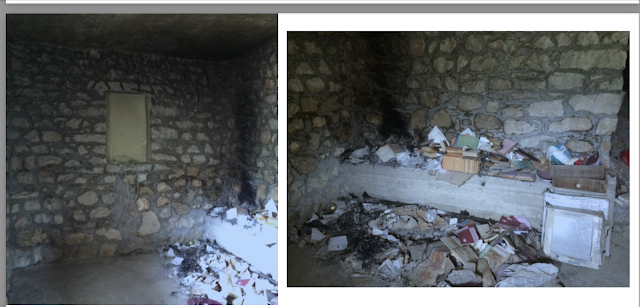Today I read that George Kevork Apelian’s “Anna the Bride” has been translated into Italian. The book was also translated into Arabic and English (by Annie Hoglind).
Anna was George Kevork Apelian's paternal grandmother. The book is about Anna, refusing to marry the prospective groom her parents had her engaged, she sneaked out of her parent’s house in the middle of the night and walked alone, all the way from her coastal village Kaladouran to her lover Kerop’s parental house in the village of Keurkune. Although elopements were not uncommon in Kessab, but never a girl had walked on her own to her lover’s house before. Her elopement and the subsequent feud between the families became part of the folklore of Kessab and a tune was continued to be sung about the event during marriage festivities for long, well after Anna, Kerop were no more.
The young couple fathered two sons, Kerop and James, the author’s father. But her husband left for the U.S. to join his two brothers and have his pregnant wife and son join him after he settled. Anna and her children left Iskenderun on ship to Marseille France to continue their journey to the U.S. But she was not permitted to immigrate. Forced to return to Keurkune, she was deported with her in-laws and sister-in-law on their genocidal march where she, her elder son, her in-laws succumbed to the ordeal. Only her younger son James and her sister-in-law Karoun, my maternal grandmother, survived. She became James' guardian angel.
“Anna the Bride” is the story of Anna Tititian. A true story and the staff of which movies are made.
Anna hailed from the Titizian family. Shahe' Kasparian wrote this poem in the memory of Anna who was his wife Sylva’s and his brother-in-laws: John and Garbis Titizian’s paternal grandfather’s sister.
Anna The Bride
A striking pearl necklace adorning her neck,
she was so stunning with hazel almond eyes,
a gorgeous complexion with no speck,
glowing beauty in the midnight moonrise.
Long silky black hair, braided to her waist,
she shined, the moon paling in comparison,
a daunting and arduous journey she faced
in a lacy traditional shawl delightfully crimson.
In the middle of the night, shivering and cold
with a scant foot sandal, walked over rocks
amidst the howling of coyotes so bold,
never to look back, strolled so many blocks.
She was engaged to one not of her choosing,
she denied her father's & mother's strong wish
and in spite of their will, not a minute losing
she embarked on a voyage of uncertain finish.
No one so pretty like her had dared elope
alone in the dark she carried on and on,
frightened and confused down the slope,
determined to get to her lover before dawn.
Sobbing at times but surely always smiling
she longed for the encounter and anticipated
the last step in her new passage and yearning,
new beginning, new chapter, to be created.
And so, she was united at last with her lover,
betrothed to each other for all eternity
conceived their first child under heavy cover
only to be separated from her community.
He travelled far away to the Land of the Free
sent word for her to name their second child
possibilities for a family reunion never to be
but she never lost hope and always complied.
Sad circumstances looming over the horizon,
once again she was forced against all her wishes
time to walk the march of death with no reason
like her million and a half sisters and brothers.
Evil Ottoman empire schemed to annihilate,
eradicate any trace of Armenian descendants
but their plans were destined to a different fate
children scattered in the world of remnants.
She and her firstborn went through carnage
succumbed to an untimely and tragic death
her angelic life curtailed like her marriage
only to leave a legacy of precious breath.
Anna Bride will always be remembered
even though she has no grave or tombstone
she lives on in the ten million strong bred
her indomitable spirit surely infinitely grown.
Shahe' Kasparian 2-14-14


















